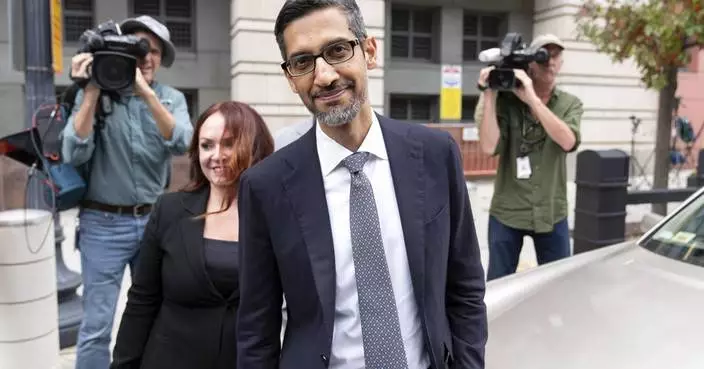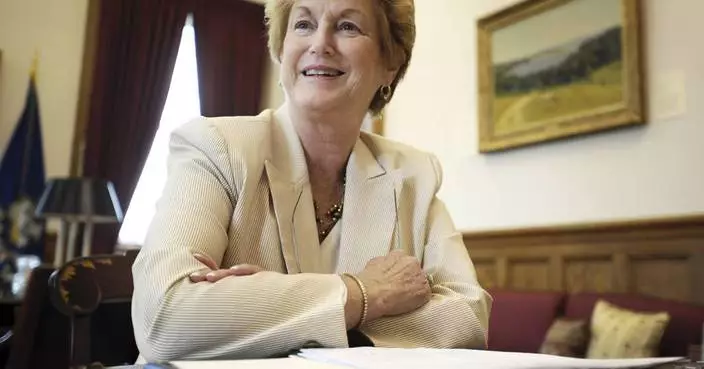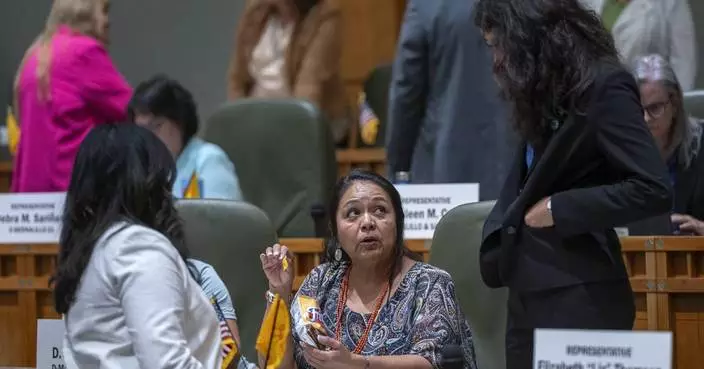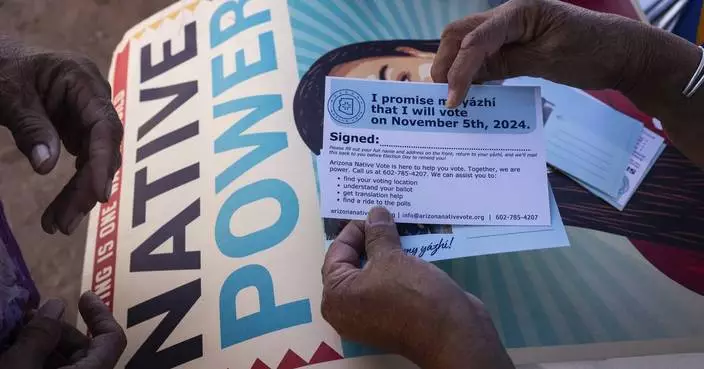MALAGA, Spain (AP) — U.S. Davis Cup captain Bob Bryan knows all about winning at doubles — 16 Grand Slam titles and a recent selection to the International Tennis Hall of Fame make that obvious — yet his decision to make a last-second change to his lineup against Australia on Thursday led to a loss.
With the best-of-three quarterfinal even at 1-1 heading into the deciding doubles match, Bryan opted to switch from an established duo, Paris Olympics silver medalists Austin Krajicek and Rajeev Ram, to a pairing of two singles players, Tommy Paul and Ben Shelton. Paul and Shelton were beaten 6-4, 6-4 by Matt Ebden and Jordan Thompson, putting the Australians in the semifinals and sending the Americans home, extending their drought without a Davis Cup title to 17 years.
Click to Gallery
Taylor Fritz of the United States returns the ball to Australia's Alex de Minaur during a Davis Cup quarterfinal match at the Martin Carpena Sports Hall, in Malaga, southern Spain, on Thursday, Nov. 21, 2024. (AP Photo/Manu Fernandez)
Taylor Fritz of the United States celebrates a point against Australia's Alex de Minaur during a Davis Cup quarterfinal match at the Martin Carpena Sports Hall, in Malaga, southern Spain, on Thursday, Nov. 21, 2024. (AP Photo/Manu Fernandez)
Ben Shelton of the United States reacts against Australia's Athanasios Kokkinakis during a Davis Cup quarterfinal match at the Martin Carpena Sports Hall, in Malaga, southern Spain, on Thursday, Nov. 21, 2024. (AP Photo/Manu Fernandez)
Tommy Paul, right and Ben Shelton of the United States, return the ball to Australia's Matthew Ebden and Jordan Thompson, during their doubles tennis quarterfinal Davis Cup match at the Martin Carpena Sports Hall, in Malaga, southern Spain, on Thursday, Nov. 21, 2024. (AP Photo/Manu Fernandez)
Australia's Matthew Ebden, left, and Jordan Thompson celebrate their victory against Tommy Paul and Ben Shelton of the United States, during their doubles tennis quarterfinal Davis Cup match at the Martin Carpena Sports Hall, in Malaga, southern Spain, on Thursday, Nov. 21, 2024. (AP Photo/Manu Fernandez)
Australia's Matthew Ebden, left, and Jordan Thompson shake hands after defeating Tommy Paul and Ben Shelton of the United States during their doubles tennis quarterfinal Davis Cup match at the Martin Carpena Sports Hall, in Malaga, southern Spain, on Thursday, Nov. 21, 2024. (AP Photo/Manu Fernandez)
“We were hoping to catch the Aussies a little bit by surprise,” Bryan said. "We took a shot at it."
Didn't work.
“It didn’t surprise us that much, to be honest,” Australian captain Lleyton Hewitt said. “I’d seen (Paul and Shelton) do drills during the week, so, yeah, it wasn’t a surprise.”
The U.S. owns a record 32 championships from the event, but the most recent came in 2007 — when Bryan was a member of the team. The American men haven’t made the Davis Cup semifinals since 2018.
Ebden and Thompson both have claimed Grand Slam doubles titles with other partners. Paul and Shelton both have been to major semifinals in singles, but don't play a lot of doubles. They only had competed as a team at one ATP tournament, the 2023 Miami Open, where they went 2-1 and exited in the quarterfinals.
Other explanations offered by Bryan for the move included that Ebden is more familiar with the games of Krajicek and Ram — Ebden and John Peers beat those two in the Paris Games final in August for the men's doubles gold — and that Shelton was already in “rhythm out there” because he competed earlier in the day in singles.
Shelton lost that one to Thanasi Kokkinakis 6-1, 4-6, 7-6 (14) after staving off six match points but failing to convert four of his own.
“Heartbreaking, for sure,” Shelton called it.
U.S. Open runner-up Taylor Fritz then won 6-3, 6-4 against Alex de Minaur to pull the Americans even.
It was during the 15 minutes or so after that match on an indoor hard court at the Palacio de Deportes Jose Maria Martina Carpena in southern Spain, Bryan said, that the doubles choice was made.
“As a captain, you have to make tough decisions. I had a lot of information behind the decision. We have been here for six days, practicing. We know how everyone is feeling. And we know a lot about the opponents that we’re playing. It’s a world of analytics,” Bryan said. “You talk amongst the other coaches. You talk with the players. ... This wasn’t a black-and-white decision. It was razor-thin edge, and we went with it.”
Thursday marked Shelton's debut in Davis Cup competition.
“To not get a win in one of those two matches," he said, “hurts pretty bad.”
AP tennis: https://apnews.com/hub/tennis

Taylor Fritz of the United States returns the ball to Australia's Alex de Minaur during a Davis Cup quarterfinal match at the Martin Carpena Sports Hall, in Malaga, southern Spain, on Thursday, Nov. 21, 2024. (AP Photo/Manu Fernandez)

Taylor Fritz of the United States celebrates a point against Australia's Alex de Minaur during a Davis Cup quarterfinal match at the Martin Carpena Sports Hall, in Malaga, southern Spain, on Thursday, Nov. 21, 2024. (AP Photo/Manu Fernandez)

Ben Shelton of the United States reacts against Australia's Athanasios Kokkinakis during a Davis Cup quarterfinal match at the Martin Carpena Sports Hall, in Malaga, southern Spain, on Thursday, Nov. 21, 2024. (AP Photo/Manu Fernandez)

Tommy Paul, right and Ben Shelton of the United States, return the ball to Australia's Matthew Ebden and Jordan Thompson, during their doubles tennis quarterfinal Davis Cup match at the Martin Carpena Sports Hall, in Malaga, southern Spain, on Thursday, Nov. 21, 2024. (AP Photo/Manu Fernandez)

Australia's Matthew Ebden, left, and Jordan Thompson celebrate their victory against Tommy Paul and Ben Shelton of the United States, during their doubles tennis quarterfinal Davis Cup match at the Martin Carpena Sports Hall, in Malaga, southern Spain, on Thursday, Nov. 21, 2024. (AP Photo/Manu Fernandez)

Australia's Matthew Ebden, left, and Jordan Thompson shake hands after defeating Tommy Paul and Ben Shelton of the United States during their doubles tennis quarterfinal Davis Cup match at the Martin Carpena Sports Hall, in Malaga, southern Spain, on Thursday, Nov. 21, 2024. (AP Photo/Manu Fernandez)
WASHINGTON (AP) — The U.S. House passed legislation Thursday that would give the Treasury Department unilateral authority to strip the tax-exempt status of nonprofits it claims support terrorism, alarming civil liberties groups about how a second Trump presidency could invoke it to punish political opponents.
The bill passed 219-184, with the majority of the support coming from Republicans who accused Democrats of reversing course in their support for the “common sense” proposal only after Donald Trump was elected to a second term earlier this month.
Speaking on the House floor ahead of the vote, Rep. Jason Smith, GOP chair of the House Ways and Means Committee, said his colleagues across the aisle would still be supporting the bill if Vice President Kamala Harris won the presidential United States. And we, as members of Congress, have the duty to make sure that taxpayers are not subsidizing terrorism,” the Missouri lawmaker said. “It’s very, very simple.”
But the proposal has drawn concern from a range of nonprofits who say it could be used to target organizations, including news outlets, universities, and civil society groups, that a future presidential administration disagrees with. They say it does not offer groups enough due process.
“This bill is an authoritarian play by Republicans to expand the sweeping powers of the executive branch, to go after political enemies and stifle political dissent," Rep. Pramila Jayapal, the chair of the Congressional Progressive Caucus, said on the House floor ahead of the vote.
Critics also see it as redundant as it is already against U.S. law to support designated terrorist groups. The proposal, which now goes to the Democratic-controlled Senate where its fate is uncertain, would also postpone tax filing deadlines for Americans held hostage or unlawfully detained abroad.
The bill would create a new category of “terrorist supporting organizations,” according to an analysis by the Congressional Research Service of a previous version of the legislation. This category is defined as any organization the Treasury Secretary designates as having provided material support to a terrorist organization in the past three years.
“We think this legislation is an overreach,” said Jenn Holcomb, vice president of government affairs at the Council on Foundations. “It would allow the Secretary of the Treasury to designate a 501c nonprofit as a terrorist organization at their discretion. And our concern is it doesn’t have enough in there to really ensure that a nonprofit understands the reasoning that a secretary designated as such.”
The bill would give a nonprofit designated as a “terror-supporting” 90 days to appeal that designation. Nonprofits like the American Civil Liberties Union have said that the bill does not require that the Secretary of Treasury disclose all the evidence that was used to make the designation.
The bill text outlines how the Treasury must send “a description of such material support or resources to the extent consistent with national security and law enforcement interests.”
In a joint statement with the Independent Sector, National Council of Nonprofits, and United Philanthropy Forum, the Council on Foundations also said the bill would shift the burden of proof to the nonprofit, and even if an organization was eventually cleared, the nonprofit would “risk irreparable damage to their operations and reputation.”
If it were to become law, the bill could apply to a range of nonprofits, including membership organizations, unions and private foundations.
A version of the bill was first introduced after the Oct. 7, 2023 Hamas attack on Israel and the House passed a previous version of the bill in April, including with the support of some Democrats.
The bill was also brought up for a vote last week but failed to garner a two-thirds majority required under the suspension of the rules.
Democrat Rep. Rashida Tlaib, the only Palestinian-American representative in Congress, said Thursday before the vote it would be her third time voting against the bill.
“I don’t care who the president of the United States is,” she said. "This is a dangerous and unconstitutional bill that would allow unchecked power to target nonprofit organizations as political enemies and shut them down without due process.”
Associated Press coverage of philanthropy and non-profits receives support through the AP’s collaboration with The Conversation US, with funding from Lilly Endowment Inc. The AP is solely responsible for this content. For all of AP’s philanthropy coverage, visit https://apnews.com/hub/philanthropy.
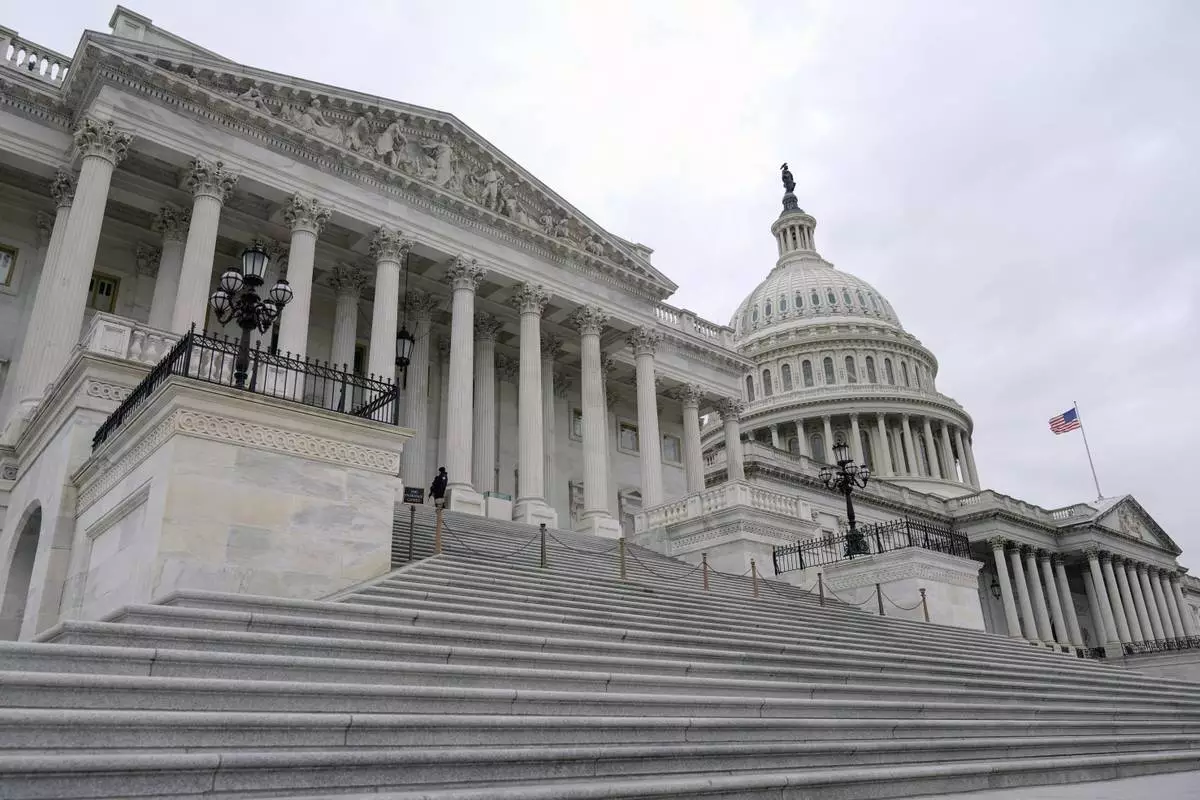
The U.S. Capitol, including the House of Representatives, left, are seen on Thursday, Nov. 14, 2024, in Washington. (AP Photo/Mariam Zuhaib)

















